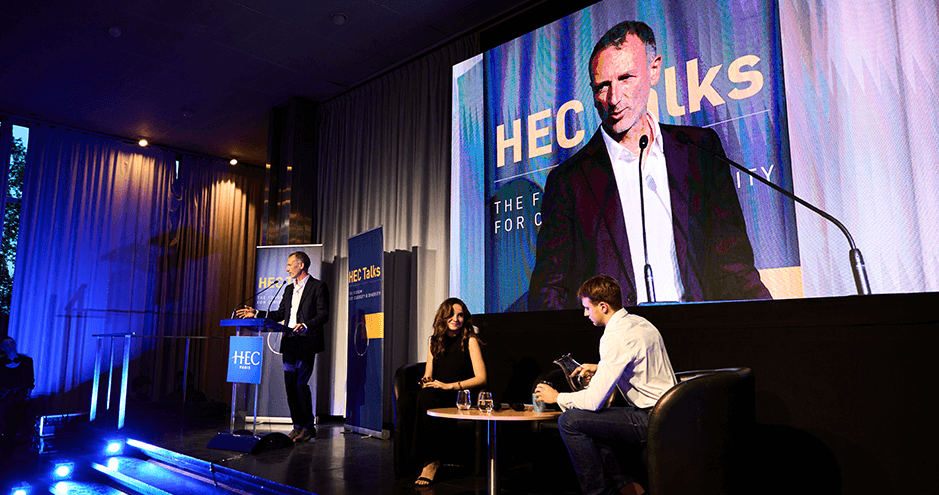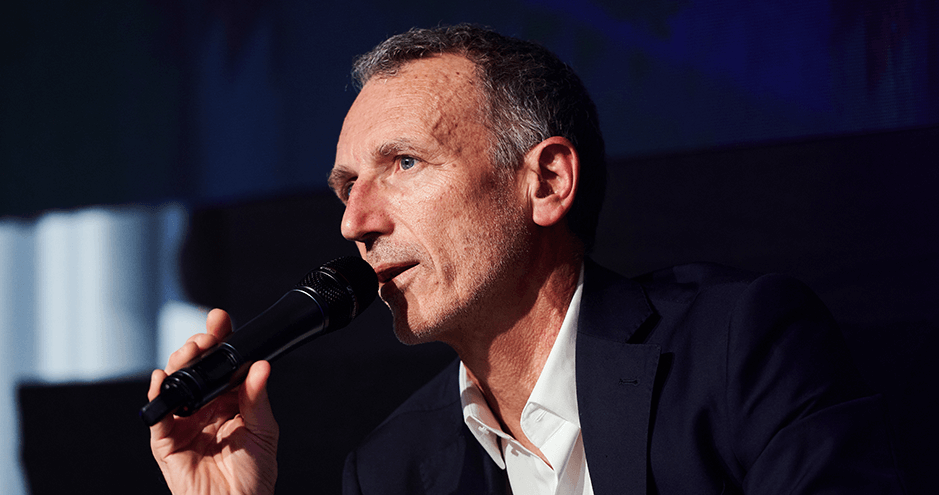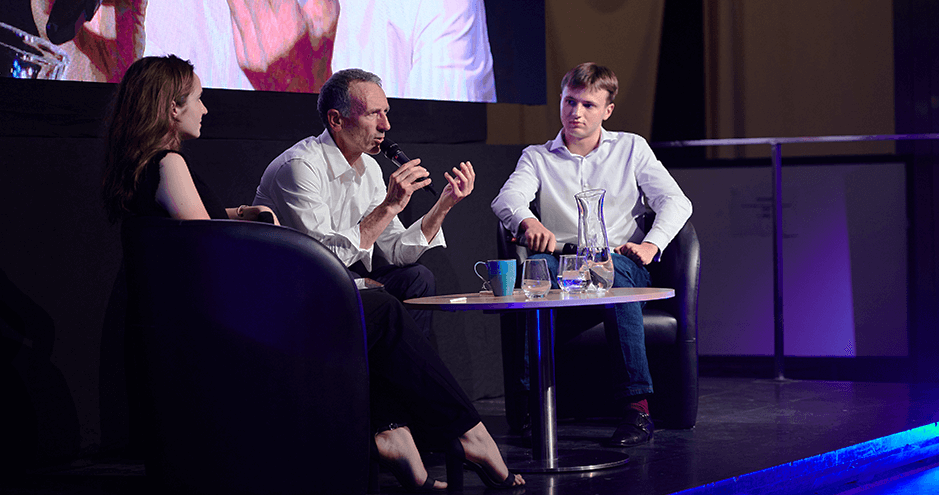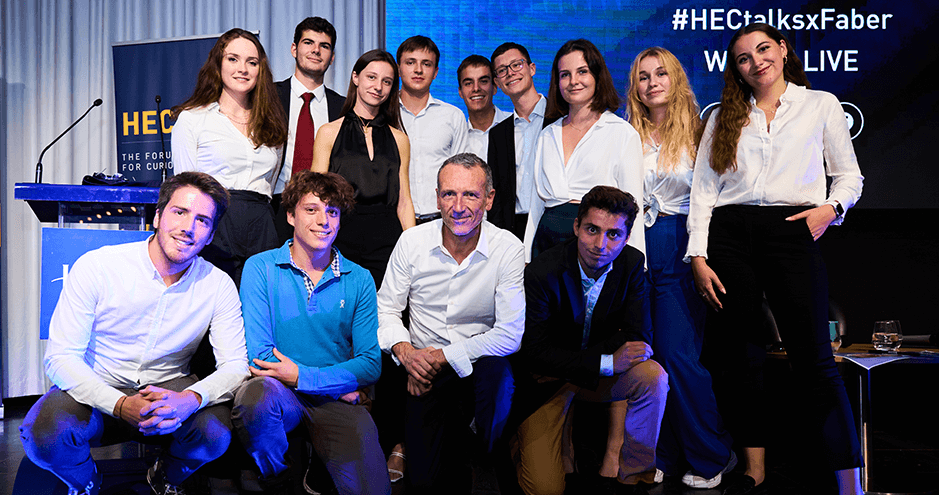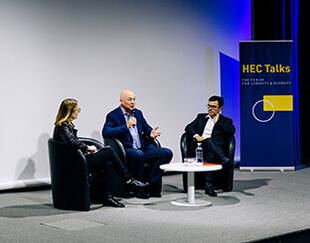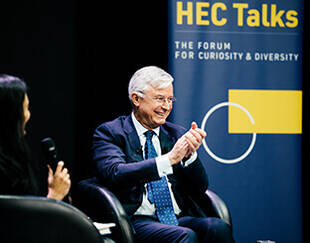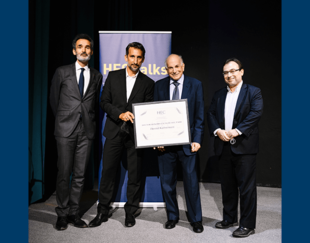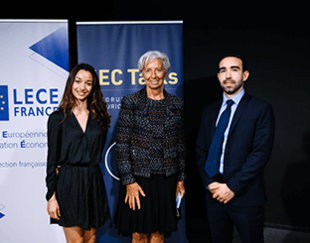Faber’s Clarion Call to Students: “Don’t Quit ! Redefine the Economies of Tomorrow”
ISSB Chairperson Emmanuel Faber kickstarted the 2022-2023 HEC Talks season with an impassioned plea to students to “reinvent the future” through resilience and a regenerative culture. The September 12 talk by the former Danone CEO marked Faber’s first return to his alma mater since the 2016 Commencement Day speech which drew millions of viewers and transformed Faber’s public image.
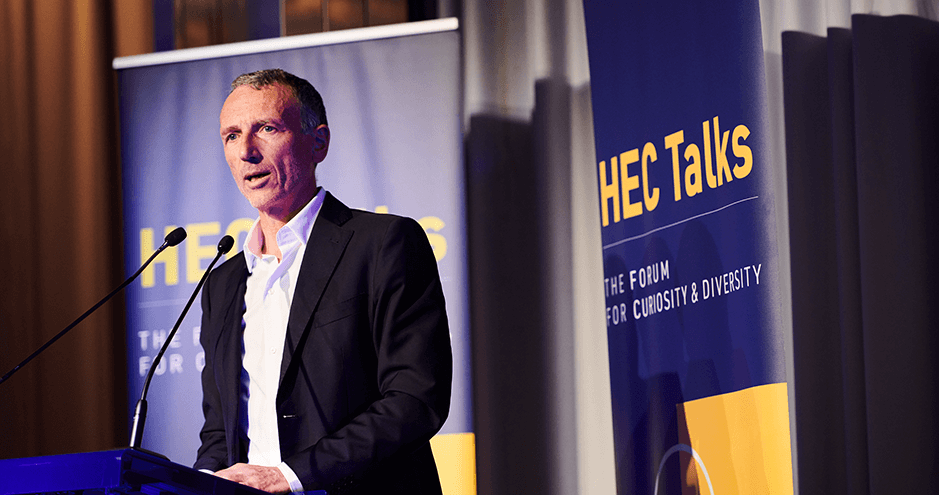
(© Ciprian Olteanu - Madetoshow.com)
A capacity crowd packed into HEC’s Hall d’honneur for the highly anticipated return on campus of 58-year-old Emmanuel Faber. In a brief introduction, Dean Eloïc Peyrache greeted the 1986 alumnus by summing up Faber’s career in two sentences: “As a CEO, Emmanuel tried to change the rules of the games and impacted the lives of millions. Now, he’s on a crucial mission at the very heart of the challenges our world faces.”
And Emmanuel Faber did not disappoint. Six years on from his landmark talk in front of 2016 graduates, Faber delivered another inspirational speech drawing an action plan to answer the world’s climate challenges. In the course of his 70 minute exchange with around 1,000 students present, the self-styled “Change maker” denounced the failures of the post-COVID Build Back Better recovery; he pinpointed the fear, selfishness and blindness behind these failures; he set out examples of resilience to overcome these weaknesses; he mapped out the inevitability of redefining economics; and, adamantly, he pleaded to the future leaders present not to quit in the face of adversity.
But first, this mountain climbing enthusiast shared his sobering experience this summer near the Alpine town of Chamonix. “I witnessed my biggest ever rock avalanche a mere 200 meters away. We were 4,000 meters high, and the snow was not freezing – I’d never seen anything like it before. Just to say, that things are changing fast and we see it most in this fragile ecosystem.” Faber linked his climb to similar experiences HEC students had as part of their three-day Purpose & Sustainability seminar which opened up their academic year. “This HEC initiative has been a wonderful introduction to the challenges we now face, to see the impact of global warming before our eyes. It is so important that you now spend three years at HEC thinking of these issues and options to tackle them.”
Rewriting Sustainability Standards
One option Faber has been exploring for years is establishing new sustainability standards for the world’s economies. The International Sustainability Standards Board (ISSB) he chairs has been actively lobbying to transform market accounting and economics by costing externalities such as climate, water, biodiversity, and other ESG matters. “Traditionally, we assume oil, healthy soils for food, energy or people’s talents come for free. Our work at the ISSB collective is to rewrite economics for capital markets, to make decisions on the basis of these externalities. If we don’t, we stay blind and don’t make the right decisions for the future.”
Faber is also a member of the Transformational Economics Commission launched by the Club of Rome to answer the current health-biodiversity-climate crises through socio-political and economic approaches. Such approaches, he is convinced, can only be solved through redefining competitiveness and going beyond cost. “And, for this,” he says, “we need resilience to regenerate our national economies. Resilience must become the new engine for our economies. We have 10 years to achieve this, before we reach (the Earth’s) carbon tipping point. To avoid this point, tough decisions need to be made by elites like me, like you.”
Resilience – from Japan to Kenya
Despite the urgency, Faber remains upbeat, finding examples of resilience and new ways of thinking in entities as diverse as Shaolin monks, the Ukrainian people and the civilians in Tokyo: “After the Fukushima nuclear accident, the government asked the population to reduce its carbon emissions by at least 15%. Well, in the space of three months, the city’s 32 million people were able bring down these emissions by 20% - and still they found the strength to help the victims of the meltdown.”
During the Talk’s follow-up question-and-answers, Faber also spotlighted the agro-ecological work Kenyan farmers have been using to create a regenerative culture to answer the climate changes. “We followed 15,000 farmers in Kenya and saw that they not only raised their productivity levels, but they brought down their water consumption by 30%. So, there is a positive correlation which can inspire us to integrate this regenerative culture into our supply chains.”
Speaking for over an hour without notes, Faber ticked off a list of reasons these systemic changes have so far not been implemented: “Selfishness, fear, blindness! Leaders don’t want to risk losing their power. But, then, power becomes a poison. We don’t want such leaders, we want collective leadership and multilateralism in this non-linear and fragmented world.” The author of the 2022 work “Ouvrir une voie” (“Opening a Way”) pinpointed top C3 company boards as being particularly ill-equipped to understand the sea-changes needed to answer the climate challenges. “But this is a generational question. Those best equipped to create this global awareness is your generation. To prepare yourselves and bring in these changes, you must focus on personal development. Your HEC diploma is a powerful tool, but you must find your North Star, your unique melody! As we witness the climate change, and the way it reshuffles the capital landscape and redefines our economies, you must become aware of who you want to be and of all the things you can do, all the solutions you can implement that have not been tried.”
Lifetime Journey
“Thank you for a stunning presentation,” said one. “You underline the urgency. But many young people see the changes you are calling for as unfair, they go against their education and promises of a nice, simple life.” Another wondered what role they could play in the transformation / environmental development of emerging countries. Whilst a third asked if economic decline is the only way to respond to the challenge of this environmental crisis. Too many questions for Emmanuel Faber to answer. Instead, he left the students with an invitation to accept that the journey to transformation is not designed for easy happiness which promises to keep the status quo. “Instead, yours is a lifetime journey where you will meet incredible people who could change you vision of a good life and, in the end, may change who you are.”
